 When I was a kid, someone pointed out that the shape of the inside of your ear was similar to the shape of how you looked as a fetus. At the time, I chalked it up to one of those fantastical things kids say to exaggerate a correlation. But years later in advertising school, one of my professors had us gather the leaves from a lemon tree and then look at how it compared to the shape of the tree itself. Amazingly, the veins of the leaf seemed to match the branches of the tree, and the leaf’s shape was similar to the tree’s overall shape. Could it be possible that the parts of a living object represent the whole? And if so, how far back could we go to see similarities of ourselves as a society—to the lines in our palms, the DNA in our genes, or even the atoms in our bodies?
When I was a kid, someone pointed out that the shape of the inside of your ear was similar to the shape of how you looked as a fetus. At the time, I chalked it up to one of those fantastical things kids say to exaggerate a correlation. But years later in advertising school, one of my professors had us gather the leaves from a lemon tree and then look at how it compared to the shape of the tree itself. Amazingly, the veins of the leaf seemed to match the branches of the tree, and the leaf’s shape was similar to the tree’s overall shape. Could it be possible that the parts of a living object represent the whole? And if so, how far back could we go to see similarities of ourselves as a society—to the lines in our palms, the DNA in our genes, or even the atoms in our bodies?
 We are living through some pretty dark times. The economy continues to be horrendous with the middle class going through the toughest challenges it’s ever had to face. To make matters worse, natural disasters are becoming more powerful and frequent than ever before, the uprisings in the Middle East are bringing unprecedented instability to the region, and if these “end of days” scenarios weren’t enough, the Maya, Nostradamus, and others all actually predicted the end of the world in 2012. It’s not like this is anything you haven’t heard on the media or from others dozens of times before. The funny thing? None of it’s true. Lately, we’ve been hearing and accepting dozens of statistics like these without question. It’s a sinfully delicious dessert the entire world seems to be stuffing themselves with: the chocolate cake of negativity.
We are living through some pretty dark times. The economy continues to be horrendous with the middle class going through the toughest challenges it’s ever had to face. To make matters worse, natural disasters are becoming more powerful and frequent than ever before, the uprisings in the Middle East are bringing unprecedented instability to the region, and if these “end of days” scenarios weren’t enough, the Maya, Nostradamus, and others all actually predicted the end of the world in 2012. It’s not like this is anything you haven’t heard on the media or from others dozens of times before. The funny thing? None of it’s true. Lately, we’ve been hearing and accepting dozens of statistics like these without question. It’s a sinfully delicious dessert the entire world seems to be stuffing themselves with: the chocolate cake of negativity.
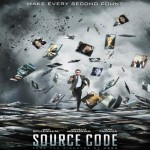 As mentioned in last quarter’s column, there have been a lot of “life-as-illusion” themed movies coming out lately. While I suspect that the success of Avatar and Lost are partly responsible for this trend, I think people’s fascination with 2012, drastic world changes, and a surge in our search for meaning are also fueling the recent string of films about alternate realities and simulated worlds. When airplanes are crashing into buildings, cities are submerged underwater, the Middle East is revolting, and the world economy is collapsing, real life almost seems more fantastical than our dreams. Jon Stewart summed it up perfectly at the 2008 Academy Awards: “Normally, when you see a black man or a woman president, an asteroid is about to hit the Statue of Liberty.” Yes, we are now officially living in the future, and we all know what kind of stuff happens in the future—exactly the kind of stuff that’s happening right now. But at least, thanks to Hollywood, we’ve been warned. And Hollywood’s heads up may even go much deeper than prophesies of events to come. They may help explain the reality we all find ourselves in.
As mentioned in last quarter’s column, there have been a lot of “life-as-illusion” themed movies coming out lately. While I suspect that the success of Avatar and Lost are partly responsible for this trend, I think people’s fascination with 2012, drastic world changes, and a surge in our search for meaning are also fueling the recent string of films about alternate realities and simulated worlds. When airplanes are crashing into buildings, cities are submerged underwater, the Middle East is revolting, and the world economy is collapsing, real life almost seems more fantastical than our dreams. Jon Stewart summed it up perfectly at the 2008 Academy Awards: “Normally, when you see a black man or a woman president, an asteroid is about to hit the Statue of Liberty.” Yes, we are now officially living in the future, and we all know what kind of stuff happens in the future—exactly the kind of stuff that’s happening right now. But at least, thanks to Hollywood, we’ve been warned. And Hollywood’s heads up may even go much deeper than prophesies of events to come. They may help explain the reality we all find ourselves in.
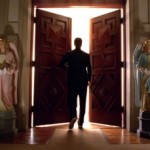 Lost is dead. Long live Lost. And so it ends, in much the same way it began—with a close-up of Jack’s eye, staring straight up past the tall stalks of bamboo that circled the sky above. This time however, that eye would close, and with it, our six-season journey that took us right back to where we started—with questions about a mysterious show that seemed to parallel the mysteries of life. For some, the journey was far more compelling than the destination. For others, it was the perfect resolution and they can walk away feeling fulfilled. Whatever you thought about the conclusion, the one thing most viewers can agree on is that the show challenged us to think in ways we might not have otherwise. In short, Lost was a real trip. And what a long, strange trip it’s been.
Lost is dead. Long live Lost. And so it ends, in much the same way it began—with a close-up of Jack’s eye, staring straight up past the tall stalks of bamboo that circled the sky above. This time however, that eye would close, and with it, our six-season journey that took us right back to where we started—with questions about a mysterious show that seemed to parallel the mysteries of life. For some, the journey was far more compelling than the destination. For others, it was the perfect resolution and they can walk away feeling fulfilled. Whatever you thought about the conclusion, the one thing most viewers can agree on is that the show challenged us to think in ways we might not have otherwise. In short, Lost was a real trip. And what a long, strange trip it’s been.
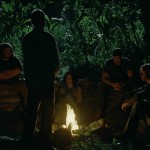 In the penultimate episode of Lost, “What They Died For,” Jacob tells the surviving Losties why he chose them as candidates: “I chose you because you were all alone. You were all looking for something that you couldn’t find out there. I chose you because you needed this place as much as it needed you.” This explanation really resonated with me, on one hand because it provided a mythologically sound answer to the main question I’ve always had about Lost: why do all these characters have major issues? And having that answer provided the other reason I really liked the explanation: I immediately understood that while Jacob was addressing the remaining candidates, he was really speaking to us.
In the penultimate episode of Lost, “What They Died For,” Jacob tells the surviving Losties why he chose them as candidates: “I chose you because you were all alone. You were all looking for something that you couldn’t find out there. I chose you because you needed this place as much as it needed you.” This explanation really resonated with me, on one hand because it provided a mythologically sound answer to the main question I’ve always had about Lost: why do all these characters have major issues? And having that answer provided the other reason I really liked the explanation: I immediately understood that while Jacob was addressing the remaining candidates, he was really speaking to us.
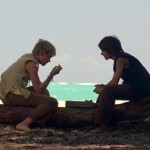 In “Across the Sea,” Lost finally gives us the origins story for Jacob and the Man In Black. The episode was pure, 100% mythology. Those who watched the episode based on the surface story alone were probably disappointed. Let’s face it, taken literally, myths are silly: talking snakes, little boys defeating giants, jealous gods, immaculate conceptions, mortals with superpowers, a sword stuck in a stone, the Force, Never Never Land, Wonderland, Oz, the Matrix, the Island. On the surface, all myths seem like children’s stories. It’s only when we dig deeper that we find the truth worthy of a wise old soul—a soul that knows where it really came from.
In “Across the Sea,” Lost finally gives us the origins story for Jacob and the Man In Black. The episode was pure, 100% mythology. Those who watched the episode based on the surface story alone were probably disappointed. Let’s face it, taken literally, myths are silly: talking snakes, little boys defeating giants, jealous gods, immaculate conceptions, mortals with superpowers, a sword stuck in a stone, the Force, Never Never Land, Wonderland, Oz, the Matrix, the Island. On the surface, all myths seem like children’s stories. It’s only when we dig deeper that we find the truth worthy of a wise old soul—a soul that knows where it really came from.
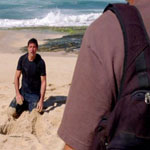 In Lost’s “The Last Recruit,” the Man In Black refers to John Locke as a “sucker” for believing in fate. As he points out, Locke pursued this belief until it got him killed so perhaps MIB has a point. Despite his compelling argument, Jack takes a leap of faith towards the exact same conclusion as his former nemesis. So does this make Jack—the last recruit himself—a sucker too? My short answer is yes, but, what if this isn’t necessarily a bad thing?
In Lost’s “The Last Recruit,” the Man In Black refers to John Locke as a “sucker” for believing in fate. As he points out, Locke pursued this belief until it got him killed so perhaps MIB has a point. Despite his compelling argument, Jack takes a leap of faith towards the exact same conclusion as his former nemesis. So does this make Jack—the last recruit himself—a sucker too? My short answer is yes, but, what if this isn’t necessarily a bad thing?
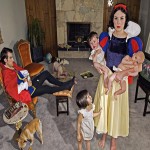 Once upon a time, you believed that you were very special. That you’d grow up to make a difference in the world, be paid handsomely for doing so, find true love, have some equally special children, and live happily ever after. Unfortunately, life hasn’t worked out quite as good as the fairytale. So, were we all lied to? In Lost’s “Happily Ever After” Desmond discovers that there is a reality where all his dreams can come true. So where is this reality and do we need to be as special as Desmond to get there?
Once upon a time, you believed that you were very special. That you’d grow up to make a difference in the world, be paid handsomely for doing so, find true love, have some equally special children, and live happily ever after. Unfortunately, life hasn’t worked out quite as good as the fairytale. So, were we all lied to? In Lost’s “Happily Ever After” Desmond discovers that there is a reality where all his dreams can come true. So where is this reality and do we need to be as special as Desmond to get there?
 In “Ab Aeterno,” Richard Alpert loses his faith after discovering that the plan he’s dedicated so much of his life to, may in fact, not exist. From the very same episode, some Lost fans began feeling the same. For six years, Lost viewers with an insatiable hunger for answers have anxiously waited to find out what the mysterious island actually is. At the writer’s strike a couple years ago, Carlton Cuse held up a picket sign that read: “Do You Want To Know What The Island Is??” Thousands of fans have dreamed up imaginative theories, all in an attempt to solve the show’s complex riddle. And now at last we have our answer! According to Jacob himself, the island is…A CORK!!! (crickets)
In “Ab Aeterno,” Richard Alpert loses his faith after discovering that the plan he’s dedicated so much of his life to, may in fact, not exist. From the very same episode, some Lost fans began feeling the same. For six years, Lost viewers with an insatiable hunger for answers have anxiously waited to find out what the mysterious island actually is. At the writer’s strike a couple years ago, Carlton Cuse held up a picket sign that read: “Do You Want To Know What The Island Is??” Thousands of fans have dreamed up imaginative theories, all in an attempt to solve the show’s complex riddle. And now at last we have our answer! According to Jacob himself, the island is…A CORK!!! (crickets)
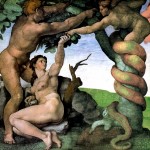 Whereas “Lighthouse” was all about our enlightenment, “Sundown” explored our dark side—temptation. “I can see her lying back in her satin dress in a room where you do what you don’t confess,” sang Gordon Lightfoot in his 1974 hit “Sundown.” The song is all about succumbing to temptation, hence once again revealing the double entendre that the Lost writers are so fond of using in their episode titles. When the sun goes down, man gets tempted by the dark. Why a “satin” dress? Sounds like Satan, don’t it?
Whereas “Lighthouse” was all about our enlightenment, “Sundown” explored our dark side—temptation. “I can see her lying back in her satin dress in a room where you do what you don’t confess,” sang Gordon Lightfoot in his 1974 hit “Sundown.” The song is all about succumbing to temptation, hence once again revealing the double entendre that the Lost writers are so fond of using in their episode titles. When the sun goes down, man gets tempted by the dark. Why a “satin” dress? Sounds like Satan, don’t it?
 When I was a kid, someone pointed out that the shape of the inside of your ear was similar to the shape of how you looked as a fetus. At the time, I chalked it up to one of those fantastical things kids say to exaggerate a correlation. But years later in advertising school, one of my professors had us gather the leaves from a lemon tree and then look at how it compared to the shape of the tree itself. Amazingly, the veins of the leaf seemed to match the branches of the tree, and the leaf’s shape was similar to the tree’s overall shape. Could it be possible that the parts of a living object represent the whole? And if so, how far back could we go to see similarities of ourselves as a society—to the lines in our palms, the DNA in our genes, or even the atoms in our bodies?
When I was a kid, someone pointed out that the shape of the inside of your ear was similar to the shape of how you looked as a fetus. At the time, I chalked it up to one of those fantastical things kids say to exaggerate a correlation. But years later in advertising school, one of my professors had us gather the leaves from a lemon tree and then look at how it compared to the shape of the tree itself. Amazingly, the veins of the leaf seemed to match the branches of the tree, and the leaf’s shape was similar to the tree’s overall shape. Could it be possible that the parts of a living object represent the whole? And if so, how far back could we go to see similarities of ourselves as a society—to the lines in our palms, the DNA in our genes, or even the atoms in our bodies?









